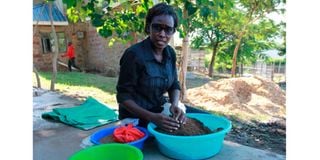Black soldier flies are my cash cow

Jenipher Okoth on her farm in Homa Bay County where she produces black soldier flies.
What you need to know:
- Jenipher Okoth rears black soldier flies which she harvests, dries and sells to fish and poultry keepers.
- She settled on feed production after identifying a gap in livestock feeds, where most farmers were complaining of high costs.
On the foot of Asego Hill in Homa Bay Town sits Jenipher Okoth’s homestead, which looks no different from the rest in the serene environment.
However, Jenipher, 35, is practising what many in the area consider unconventional farming practice. She rears black soldier flies which she harvests, dries and sells to fish and poultry keepers in what is turning out to be her cash cow as the cost of animal feeds surges.
“I started the venture mid last year after leaving formal employment where I worked as an administrator at UPA Old Mutual,” she says.
She settled on feed production after identifying a gap in livestock feeds, where most farmers were complaining of high costs.
“I visited some farmers and realised they were feeding their poultry leftovers or some had turned to free-range to cut costs. “Others had lost trust in feeds sold to them due to unscrupulous dealers.”
In the lake region, the livestock feed challenge has been compounded by decline in production of omena from Lake Victoria, with the ingredient used in making animal feeds.
Currently, a 25 kilo sack of fish feeds goes for between Sh2,500 and Sh3,000, making it unaffordable.
Breeding the insects
To start the venture, she picked lessons from YouTube videos and Facebook about breeding the black soldier flies. She also read stories about farming keeping the insects.
She started her business with 2kg larvae and 2kg pupa, investing Sh10,000, and has since expanded.
“To breed black soldier flies, you need to set up a unit with different compartments where the insects will develop from egg to adult stage. One growth cycle takes 28 days,” says Jenipher, whose black soldier flies units are made of wood, chicken mesh and polythene materials.
The larvae are white immediately after hatching and dark before being adults.
“To grow past this stage, the insects are kept in an enclosed dark environment and fed regularly with food leftovers from the kitchen. It is advisable to use a net to prevent other insects from breeding in the same area to preserve quality breeds.”
Before they mature, she picks the larvae by hand and transfers them into an open space where they become adults.
“The larvae, before turning to adult, has 40 per cent protein content and this is the best time to feed to animals. Some farmers throw the larvae to chicken or fish when they are still alive, but the best thing is to dry using solar dryers or fry them in pans before giving them to animals,” says Okoth, who sundries her product.

Jenipher Okoth on her farm in Homa Bay County where she produces black soldier flies.
But she does not sundry all, she allows some to grow into adults to lay eggs for continuous production.
“Once you master the concept, you will never run out of animal feed because the life cycle of the insects is continuous.”
Okoth is a major supplier of black soldier flies to farmers in Homa Bay County.
"I sell a kilo at Sh1,500 and Sh2,500 for eggs packed in 25g bags," Okoth says.
More income comes from offering lessons to farmers on how they can breed the flies on their own.
"I am advocating for the government to recognise farmers who breed the flies. Companies making animal feeds should incorporate the larvae as one of the protein ingredients.”
The venture has seen Okoth invited to several agriculture workshops where she shares the new farming idea.
Maintain hygiene
“Keeping the insects is not an easy task. The insects are fed on organic waste. What is not eaten is taken out to make compost manure and new feed is introduced,” she says.
To maintain hygiene, she applies engine oil on the edge of the unit to repel ants, which may kill the larvae and pupa and contaminate the unit.
It is, however, not easy to breed the flies without challenges.
She has to ward off cats and ants which are attracted by the smell the insects produce before laying eggs.
Aquaculture Business Development (ABD) programmes officer in Homa Bay Michael Omondi says high cost of feed ingredients is the major challenge affecting livestock farmers.
ABDP is a government-funded programme that supports pond aquaculture.
“A lot of farmers are using omena and soya as main ingredients in feed-making but these are now becoming scarcer. Farmers need to cut costs.”





